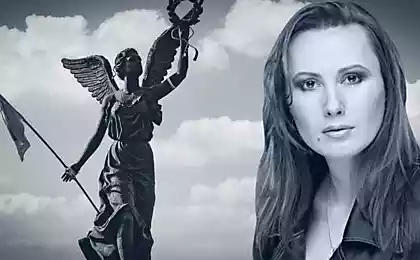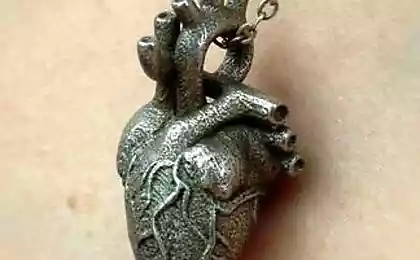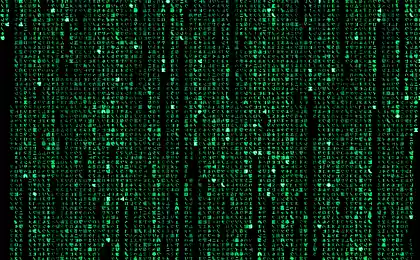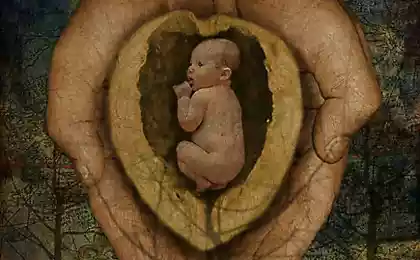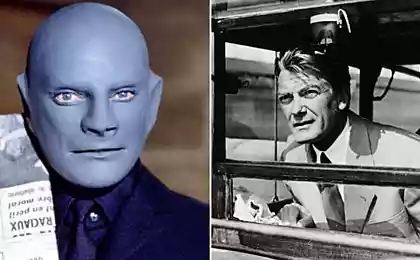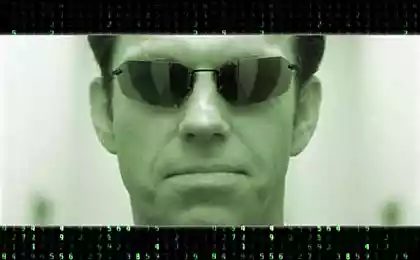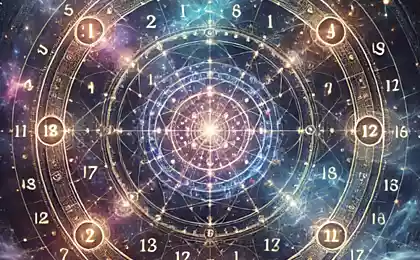705
In the shadow of the silent most
Jean Baudrillard (1929-2007) is one of my favorite philosophers of our time, to tell the truth about what is happening around the author of interesting works on philosophy and sociology.
The beginning of a conversation about Baudrillard can be preceded by an interesting fact. In the first part of "the Matrix" hero by the name of Thomas Anderson in the beginning of the action opens the book Baudrillard "Simulacra and simulation", Chapter "On nihilism." In this book he keeps discs with computer programs, which then sells on the black market (though, this Chapter is actually at the end of the book, not in the middle as shown in the film, but not the point).
Where Baudrillard? The plot of "the Matrix" based on computer technologies that have reached a high point in its development. The real world is the desert, life is only possible deep in the earth. And if earlier the fiction created the image of a traveler-mover to other worlds, other Universes, fighting for new territory in "the Matrix," the obvious new twist to this theme. "The matrix" did not invent a new reality, she re-created her, but as a fiction, a hallucination is real, however, surprisingly accurate and detailed. Once in the "Matrix", the man falls into the realm of simulation or simulacra. Here Baudrillard begins.
Fifty one million one hundred eighty two thousand one hundred fifty
And now more about everything. The world of "the matrix" has become a new model of man involved in the General process of the simulation, giving a sense of reality but not reality itself. Man is not the centre of this System, moreover, the System has enslaved him. The only solution is to sacrifice their security for freedom. So do the heroes of "the Matrix".
And Baudrillard writes in the Chapter "On nihilism": terrorism, in his view, justified as a means to see the social control mechanisms. But the System initially nihilistic, is so nihilistic that can "swallow" any violence, even terrorism.
Terrorism always fails because it attacks a System from the outside. Neo at the end of the trilogy, destroying the source of the simulation, because it acts on the contrary — enters the body of the Agent and destroys it from the inside, and with it, the universal illusion of reality. And it is a Manifesto of the society covered by the simulacra — a Manifesto of freedom, of rebellion against being built around us pseudo, pseudoreality.
Sixty million eight hundred seventy one thousand three hundred seventy one
The process of simulation is so global that makes all the real coincide with the object simulations. Disappear the difference between reality and simulation. So there is no metaphysics. It's a real change of signs of the real.
The simulacrum is not what hides the truth — it is the truth that conceals that it is not.
<...> The simulacrum is a copy, the original of which is irrecoverably lost.
The first thing that catches the eye when reading any of the writings of Baudrillard is no dry academic language. There were even attempts to make his ideas beyond the philosophy. Indeed, alongside such intellectual giants as Gilles Deleuze or Jacques Derrida and other postmodern classics of philosophy, Baudrillard looks easy-to-read. However, the depth of penetration into the object of analysis and originality of ideas he left behind.
The beginning of his career
How simulacra came in sight of the philosopher? He started with a criticism of Marxism, a linguistic psychoanalysis J. Lacan, linguistics F. Saussure. Then moved on to the development of the theory of sign and communication and, finally, symbolic objects. Thus, Baudrillard constructs his theory on the convergence of economy and culture. To do this, he discovers Walter Benjamin.
Forty one million six hundred seventeen thousand three hundred sixteen
Benjamin expressed the theory that modernity has changed the nature of technical reproduction of works of art (excuse the tautology). How? Works of art are always played. But their technical play significantly changes the situation. The fact that even the most perfect copy is not capable of being original: the original, in addition, has the unique quality of being "here and now", i.e. a unique presence at a specific point in time and space.
So the original is always unique and it can be identified. But it was all in manual production. In the age of technology the concept of authenticity disappears as such. The work of art loses what makes it so — the uniqueness, extraversion, originality. A work of art, lost their uniqueness, becoming, according to Benjamin, not already involved in the arts, and politics.
Forty four million seven hundred sixty four thousand five hundred sixty three
Walter Benjamin (1892-1940)
Baudrillard reinterprets Benjamin's. In his opinion, a work of art since ancient times was attributed to art and was associated with him in this aspect. The economic side of the question (cost) due to work. Reproductive work fills our lives. Hence the term "labour-service" where the product and the performer are one. The provision of services is the provision of time of my life, waste your own body. For example, leisure is also a form of reproductive labor, for he also is governed by the society.
«System of things»
Model man's relationship to consumerism Baudrillard calls "the collection." Collection is things obstreperousness with its function. Understanding the collection is quite broad: it is the possession of space (the"car devours the miles"), time (time), domesticated animals, sex, science as collection of facts and knowledge but, most importantly, "people always collects himself". In the collection things get this burden, which they failed to convert people. Collection and based on the possession. Moreover, the collector is not so much a collector, as the manipulator of things, subordinating them to himself.
If the simulacrum is so well simulates the reality of that starts to effectively regulate it, because then, with respect to such simulacra, the person becomes an abstraction!
Two million three hundred seventy five thousand seven hundred fifty
Indeed, the deep power of things arises not from the historicity of each of them separately, and time collection are not that different from real time, but the fact that the organization of the collection is a substitute for time. Probably this is the main feature of the collection is to switch real time, plan some kind of taxonomy.
Taste, curiosity, prestige, social discourse is able to give the collection output in a wide range of human relations (whenever, however, within a narrow range), but above all, it is literally "pastime". It simply abolishes time.
Or, rather, classifying the time in the form of fixed, allowing return movement of the elements collection represents the eternal renewal of the same controlled cycle where the person is guaranteed the possibility of at any time starting from any element and exact confidence that it will be back to play in his birth and death.
It is interesting that the main things of our time exist under the sign of the loan are purchased on credit. The loan is "front running things in time." As if a person attratives from his things, he is forced to save to pay off their past in the hope to see the future. This phenomenon of the "previous future". Consumption so much that it outpaces production.
This "new ethics of consumption" means forcing associated with the feudal system. In our modern times there is a connection between the seller and the buyer, moreover, man is obliged to buy, so they can continue to produce, and he could work on to pay for already purchased. Receiving such a "loan of freedom" from society, the man himself credits the society, thus alienating their own future.
Overall, we have an interesting situation: the investigation appears to cause. This is the structure of the modern economy. The loan allows you to consume what is not yet earned. Before us is a time warp. Baudrillard writes that "we always lag behind their things."
This power of things over man is manifestations. Main form is advertising. The inspire is purchasing a certain brand of product. The main principle of advertising — "the logic of Santa Claus", i.e. the logic of their engagement in the legend.
Resisting better to the advertising imperative, we will become increasingly sensitive to advertising the indicative.
For example, the furniture in the family apartment when the family itself is the formal family is not. With the acquisition of new things such pseudoproxy "consume" the marriage relationship. Is the same as the preview stuff is campaigning a new type of social relations between security and prestige. Not a commodity, not a thing, and relationships are the true desire of the consumer.
A hierarchy of values, largely imposed by advertising. Intimate advertising: a real product in the advertisement is not depicted in her needs here and now with the help of the advertised things, and the ability to meet in General: "We don't believe in it, but it is our road".
«Consumer society»
The book was translated into Russian language in 2006 and is devoted to the problems of the "consumer society" that emerged in Europe to the 70-th years of XX century. In fact, this large-scale critical analysis of what is happening around, which is carried out from three perspectives: philosophical, sociological and economic.
To Baudrillard, it is important to emphasize that "consumer society", becoming a reality here and now, transformed into the original form of the myth, for him it cannot exist.
A consumer society is one where not only there are items and goods that you want to buy, but where the consumption is consumed in the form of myth.
The Foundation of this myth, Baudrier considers a new form of human: Homo Economicus, implying the idea of things as objects of consumption, the actual needs and ways to meet them. And that's all. If you look closely to this series, you can see its most important feature: the tautology.
Discours of the consumer society, according to Baudrillard, is entirely tautological: we purchased the thing, feeling a need for it, but at the same time we feel the need only to things that are currently offered by the market. But we are not aware of this report because I believe in the "consumption myth": the belief that things can satisfy our needs.
Who is this Homo Economicus? Baudrillard writes that such a person has two priorities: "1) to search without a shadow of doubt my own happiness; 2) to give preference to things which would have given him maximum pleasure". Consumption at the same time, paradoxically, is not a function of enjoyment. Consumption is a function of production, so it is collective. Therefore, the genealogy of consumption based on social organization, on the system involves not one individual but a whole group, affecting them as social coercion.
For example, it is impossible even to imagine a collective protest against television. Each of the millions of viewers may be unhappy with, but it will still exist. As a consumer people are always alone, representing a "cell", a gregarious creature. Consumption focused on a conversation with yourself and confined to this minimal communication, together with its pleasures and disappointments. Baudrillard writes: "the Object of consumption isolates".
But all this serenity of consumption is tied to emergencies, tragedies, violence. There is a strange tension between hedonism and morality activist. Baudrillard gives an example. Western viewer relaxes in front of the TV with coverage of the war in Vietnam.
The report comes on the TV screen from the outside world, it emotionally affects the consumer, it creates the effect of his presence in the thick of things. Under consumption personal situation safe detachment from the events in Vietnam. Mass communication, therefore, is founded on denial of the real world with the help of only his perception of the characters.
The consumer is not able to distance themselves from their needs. Instead of a mirror before which to look within themselves, to understand, now showcases — they are not our reflection, a contemplation of the many signs of consumption. Consumption a tragedy of identity, because the identity reduces to the spectrum of things.
The movement of the Windows, they counted extravaganza, which is always at the same time, deception is a waltz-"the swing" as the best shopping Kanak dance of exaltation of the benefits of sharing. Items and products here are offered in a resplendent setting, in the cult flaunting.
Ibid. S. 211.
The consumer society is not only an abundance of goods and services, but also the more important fact that everything is a service provided for consumption is never given simply as a product and service as always as satisfying. Starting with the "Guiness is good for you" ("Beer is good for you") to the deep concern of politicians to the fate of their fellow citizens, including the smile of the hostess of the hotel and gratitude to the automatic distributor of cigarettes, each of us surrounded by monstrous obliging, tied a conspiracy of devotion and benevolence. The slightest piece of soap recommends itself as the result of reflection of a whole Council of experts, working for months on the creaminess of your skin. <...> Items are not so used for a purpose, first and foremost they serve you. <...> Under the sun care tan modern consumers.
Ibid. P. 203.
Thus, consumption is a myth, or "the word of modern society, expressed in relation to himself, that's the way our society speaks about itself". Before us society, applying to it the famous advertising slogan: "the Body of which you dream, is your body." Narcissism allows you to mix themselves with the image and assert itself as an image. Such a demonstrative tautology in advertising allows the consumer to understand who he really is and what he wants really. There's no distance, erased all boundaries. The great myth of consumption is, as expected, your "antidikos": the idea of the tragic impact of consumerism on the world.
Sixty four million three hundred twenty six thousand sixty two
«America»
"America" is devoted to the problem of artificiality of life that occurred in America. The work will then be continued in the "Transparency of evil".
The book is written in the form of travel writing traveling across America philosopher. American city produces a "superhuman" feeling, reminiscent of the "extraterrestrial objects". The main feature of America was handled well:
Transsexual capitalist arrogance of mutants.
What allowed us to see in America the country of the looming Death?
Baudrillard notes that the US has no past that it would be possible to understand why America is a primitive society. America, in his opinion, is a hyperreality, utopia. The truth is this country opened the eyes of Europeans as "a perfect simulacrum, a simulacrum of immanence and material embodiment of all values." Here everything is available: sex, flowers, freedom. The release values, like orgies, forces us to seek is not sex, because it is available, and your appearance. The people of this country chooses is not between his desire and pleasure, and between their genetic formula and sexual way.
America, according to the philosopher, is an extreme degree is not authentic. The Americans, "...preseva the real baptism, the dream of all to baptize a second time, and only this later sacrament which, as you know, the repeat of the first, only far more genuine for them has the value: here's a perfect definition of the simulacrum".
Freedom and equality, as well as the ease and nobility exist only as the original data. This is a democratic sensation: the equality is given in the beginning, not the end... the Democrats demand that citizens were equal at the start, egalitarism insist that all were equal at the finish.
"The transparency of evil»
Perhaps, the culminating work of Baudrillard. Continue and the verdict of civilization begun in "America." The main characteristic of the world, the main term around which tied the study — transparency (from the French. transparence — transparency). Transparency — is the world order, the main feature of which is the creation of artificial environment, artificial life. In this artificial environment man is a pleasure to be: he is not suffering from heavy labor, disease, hunger, violence and even spared from having to reflect, to think, to experience existential angst, etc.
The modern state of things — state after the Orgy, if by Orgy explosive moment in the development of the world.
We were all ways of production and hidden overproduction of objects, signs, messages, ideologies, pleasures. Today the game is over — all released. And we all ask ourselves the main question: what to do now after the Orgy?
Humanity is moving towards the void, because his whole purpose behind. The world has gone form the final death, nothing dies or disappears, not even God.
Modernity is characterized by the transsexuality has. If sexuality is associated with enjoyment, that transsexuality has, with artificial (changing sex from a transvestite, a change of clothes, gestures), with bisexual and hermaphroditism options person.
Take a look at Ciciolina. Is there a more perfect incarnation of sex in pornographic innocence sex? Its antipode — Madonna, this virgin fruit of the aerobic and glacial aesthetic, devoid of any charm and any sensibility, muscular humanoid creature.
Because of that, and was able to create a synthetic idol. But she Ciciolina — isn't she a transsexual? Long hair, silver color, cast breast in the shape of spoons, a perfect inflatable doll, vulgar eroticism comics or sci-Fi movies, and especially — the constant talk about sex, which, however, are never perverse or of an unbridled nature, permitted deviations; in short, the perfect woman sitting in front of the pink phone, in combination with the carnivorous erotic ideology, which is probably not attributed to himself no woman, except, of course, Babes, transvestite: they are known live exaggerated symbols — eating symbols of sexuality.
Sensitive ectoplasm, which is Ciciolina, combined here with artificial nitroglycerin Madonna or the charm of Michael Jackson — the hermaphrodite in the style of Frankenstein. They are all mutants, transvestites, genetically fanciful creatures…
Along with the sexual revolution and the computer revolution. If the sexual revolution is forcing people to ask themselves the question: I'm male or female, the computer puts it differently: people I or virtual clone?
Thus, the release values "after an Orgy" put person before the challenge of finding their generic and sexual identity, while leaving him less likely to reply. Thus, according to Baudrillard, people become transsexuals. Transsexuality has expanded in all directions, has an effect even on the economy (a so-called "transeconomic").
The consequences of both sexual and computer revolutions, natural and similar to each other. In the first case it AIDS, and the second is "viruses". There was contamination (Baudrillard often comes to the metaphor of a cancerous tumor). Infection one. It passes from one system to another. And in the center — the main disaster — evil.
Where got Evil? It's everywhere — all covered, a metastasis of Evil is endless. The company went the way of killing thanks to natural aesthetic surgery, surgical beautification negative, for such companies the current debate about Good. Evil went viral and terroristic forms. And they also haunt us.
We don't know how to pronounce the curse. We can speak only of the question of human rights — reverent, weak, useless, hypocritical values, which is based on an enlightened faith in the natural power.
Good idealization of human relations (then as for Evil there is no other interpretation than the Evil itself).
Moreover, the ideal values of this kind is always referred to in the patronizing, derogatory, negative, reactionary manner. It is the reduction of Evil to a minimum, prevention of violence, the desire for security. This indulgent and pressing Force of good will thinks only about justice in society and refuses to see the curvature of Evil and its meaning.
Baudrillard J. the Transparency of evil. Moscow: Dobrosvet, 2000. P. 157.
In the "Transparency of evil" Baudrillard formulated the "theorem about the damn side of things."
There is one horrific consequence of the continuous creation of the positive. If negative engenders crisis and critique, positive, exalted to the level of hyperbole begets disaster due to the inability to allocate even crisis and criticism in homeopathic doses.
Any structure that has plagued casts conjures negative elements, is at risk of catastrophe due to a full return to the previous state, just as the biological body, which expels germs of bacilli, parasites, and other biological enemies, getting rid of them can be at risk from cancer and metastases in other words, the risk of positive, devouring its own cells, or viral risk, which manifests itself in the threat to be Poranny their own antibodies remained without application. All that spews itself from the bloody side of his fact, signed his own death warrant.
Thus, hyperreality is understood by Baudrillard as "the transparency environment". The transparency effect is achieved by the fact that everything becomes serviceman, sustainable. Transparency creates a sense obscene intimacy: "All that is hidden what else enjoy the ban will be excavated, brought to light, publicized, and evidence". Transparency is characterized by the implosion — the mutual mixing and interpenetration of the structures, categories, values.
"In the shadow of the Millennium, or suspense of the year 2000»
2000 was forced to ask the question: "In the end if we of history, beyond history, or still in an endless history?"Baudrillard believes that "there is no better allegory for the fatal countdown than the plot of Arthur C. Clarke Nine Billion names of God. The community of monks requested to clarify and list all of the names for God.
There are nine billion names. According to the prophecy, at the end of the countdown, when the last name is written, the world will come to an end. But the monks get tired and that it was moving faster, they turn to the experts at IBM who come to the rescue with an armload of computers. Job done for three months. As if world history ended in just a few seconds thanks to a virtual intervention.
Unfortunately, it also characterizes the disappearance of the world in real time. The prophecy of the end of the world, which corresponds to the exhaustion of all the names of God, becomes true. When you return from the mountains of equipment from IBM, not believing a word of this story, I see that all the stars in the sky disappear one after another.
It's a perfect allegory for our current situation... because of the intervention of numeric, cyber and virtual technologies we are already on the other side of reality, and the thing is already on the wrong side of their destruction."
Hence the main question of philosophy of the XXI century — to what extent virtual reality could transform the world as we know it? Genesis will change beyond recognition, but under the question will remain the man himself: what will become of him? And most importantly — how to maintain identity in a world likened to the desert? published
Author: Konstantin Kogut
Source: culz.ru/jean-baudrillard/
The beginning of a conversation about Baudrillard can be preceded by an interesting fact. In the first part of "the Matrix" hero by the name of Thomas Anderson in the beginning of the action opens the book Baudrillard "Simulacra and simulation", Chapter "On nihilism." In this book he keeps discs with computer programs, which then sells on the black market (though, this Chapter is actually at the end of the book, not in the middle as shown in the film, but not the point).
Where Baudrillard? The plot of "the Matrix" based on computer technologies that have reached a high point in its development. The real world is the desert, life is only possible deep in the earth. And if earlier the fiction created the image of a traveler-mover to other worlds, other Universes, fighting for new territory in "the Matrix," the obvious new twist to this theme. "The matrix" did not invent a new reality, she re-created her, but as a fiction, a hallucination is real, however, surprisingly accurate and detailed. Once in the "Matrix", the man falls into the realm of simulation or simulacra. Here Baudrillard begins.
Fifty one million one hundred eighty two thousand one hundred fifty
And now more about everything. The world of "the matrix" has become a new model of man involved in the General process of the simulation, giving a sense of reality but not reality itself. Man is not the centre of this System, moreover, the System has enslaved him. The only solution is to sacrifice their security for freedom. So do the heroes of "the Matrix".
And Baudrillard writes in the Chapter "On nihilism": terrorism, in his view, justified as a means to see the social control mechanisms. But the System initially nihilistic, is so nihilistic that can "swallow" any violence, even terrorism.
Terrorism always fails because it attacks a System from the outside. Neo at the end of the trilogy, destroying the source of the simulation, because it acts on the contrary — enters the body of the Agent and destroys it from the inside, and with it, the universal illusion of reality. And it is a Manifesto of the society covered by the simulacra — a Manifesto of freedom, of rebellion against being built around us pseudo, pseudoreality.
Sixty million eight hundred seventy one thousand three hundred seventy one
The process of simulation is so global that makes all the real coincide with the object simulations. Disappear the difference between reality and simulation. So there is no metaphysics. It's a real change of signs of the real.
The simulacrum is not what hides the truth — it is the truth that conceals that it is not.
<...> The simulacrum is a copy, the original of which is irrecoverably lost.
The first thing that catches the eye when reading any of the writings of Baudrillard is no dry academic language. There were even attempts to make his ideas beyond the philosophy. Indeed, alongside such intellectual giants as Gilles Deleuze or Jacques Derrida and other postmodern classics of philosophy, Baudrillard looks easy-to-read. However, the depth of penetration into the object of analysis and originality of ideas he left behind.
The beginning of his career
How simulacra came in sight of the philosopher? He started with a criticism of Marxism, a linguistic psychoanalysis J. Lacan, linguistics F. Saussure. Then moved on to the development of the theory of sign and communication and, finally, symbolic objects. Thus, Baudrillard constructs his theory on the convergence of economy and culture. To do this, he discovers Walter Benjamin.
Forty one million six hundred seventeen thousand three hundred sixteen
Benjamin expressed the theory that modernity has changed the nature of technical reproduction of works of art (excuse the tautology). How? Works of art are always played. But their technical play significantly changes the situation. The fact that even the most perfect copy is not capable of being original: the original, in addition, has the unique quality of being "here and now", i.e. a unique presence at a specific point in time and space.
So the original is always unique and it can be identified. But it was all in manual production. In the age of technology the concept of authenticity disappears as such. The work of art loses what makes it so — the uniqueness, extraversion, originality. A work of art, lost their uniqueness, becoming, according to Benjamin, not already involved in the arts, and politics.
Forty four million seven hundred sixty four thousand five hundred sixty three
Walter Benjamin (1892-1940)
Baudrillard reinterprets Benjamin's. In his opinion, a work of art since ancient times was attributed to art and was associated with him in this aspect. The economic side of the question (cost) due to work. Reproductive work fills our lives. Hence the term "labour-service" where the product and the performer are one. The provision of services is the provision of time of my life, waste your own body. For example, leisure is also a form of reproductive labor, for he also is governed by the society.
«System of things»
Model man's relationship to consumerism Baudrillard calls "the collection." Collection is things obstreperousness with its function. Understanding the collection is quite broad: it is the possession of space (the"car devours the miles"), time (time), domesticated animals, sex, science as collection of facts and knowledge but, most importantly, "people always collects himself". In the collection things get this burden, which they failed to convert people. Collection and based on the possession. Moreover, the collector is not so much a collector, as the manipulator of things, subordinating them to himself.
If the simulacrum is so well simulates the reality of that starts to effectively regulate it, because then, with respect to such simulacra, the person becomes an abstraction!
Two million three hundred seventy five thousand seven hundred fifty
Indeed, the deep power of things arises not from the historicity of each of them separately, and time collection are not that different from real time, but the fact that the organization of the collection is a substitute for time. Probably this is the main feature of the collection is to switch real time, plan some kind of taxonomy.
Taste, curiosity, prestige, social discourse is able to give the collection output in a wide range of human relations (whenever, however, within a narrow range), but above all, it is literally "pastime". It simply abolishes time.
Or, rather, classifying the time in the form of fixed, allowing return movement of the elements collection represents the eternal renewal of the same controlled cycle where the person is guaranteed the possibility of at any time starting from any element and exact confidence that it will be back to play in his birth and death.
It is interesting that the main things of our time exist under the sign of the loan are purchased on credit. The loan is "front running things in time." As if a person attratives from his things, he is forced to save to pay off their past in the hope to see the future. This phenomenon of the "previous future". Consumption so much that it outpaces production.
This "new ethics of consumption" means forcing associated with the feudal system. In our modern times there is a connection between the seller and the buyer, moreover, man is obliged to buy, so they can continue to produce, and he could work on to pay for already purchased. Receiving such a "loan of freedom" from society, the man himself credits the society, thus alienating their own future.
Overall, we have an interesting situation: the investigation appears to cause. This is the structure of the modern economy. The loan allows you to consume what is not yet earned. Before us is a time warp. Baudrillard writes that "we always lag behind their things."
This power of things over man is manifestations. Main form is advertising. The inspire is purchasing a certain brand of product. The main principle of advertising — "the logic of Santa Claus", i.e. the logic of their engagement in the legend.
Resisting better to the advertising imperative, we will become increasingly sensitive to advertising the indicative.
For example, the furniture in the family apartment when the family itself is the formal family is not. With the acquisition of new things such pseudoproxy "consume" the marriage relationship. Is the same as the preview stuff is campaigning a new type of social relations between security and prestige. Not a commodity, not a thing, and relationships are the true desire of the consumer.
A hierarchy of values, largely imposed by advertising. Intimate advertising: a real product in the advertisement is not depicted in her needs here and now with the help of the advertised things, and the ability to meet in General: "We don't believe in it, but it is our road".
«Consumer society»
The book was translated into Russian language in 2006 and is devoted to the problems of the "consumer society" that emerged in Europe to the 70-th years of XX century. In fact, this large-scale critical analysis of what is happening around, which is carried out from three perspectives: philosophical, sociological and economic.
To Baudrillard, it is important to emphasize that "consumer society", becoming a reality here and now, transformed into the original form of the myth, for him it cannot exist.
A consumer society is one where not only there are items and goods that you want to buy, but where the consumption is consumed in the form of myth.
The Foundation of this myth, Baudrier considers a new form of human: Homo Economicus, implying the idea of things as objects of consumption, the actual needs and ways to meet them. And that's all. If you look closely to this series, you can see its most important feature: the tautology.
Discours of the consumer society, according to Baudrillard, is entirely tautological: we purchased the thing, feeling a need for it, but at the same time we feel the need only to things that are currently offered by the market. But we are not aware of this report because I believe in the "consumption myth": the belief that things can satisfy our needs.
Who is this Homo Economicus? Baudrillard writes that such a person has two priorities: "1) to search without a shadow of doubt my own happiness; 2) to give preference to things which would have given him maximum pleasure". Consumption at the same time, paradoxically, is not a function of enjoyment. Consumption is a function of production, so it is collective. Therefore, the genealogy of consumption based on social organization, on the system involves not one individual but a whole group, affecting them as social coercion.
For example, it is impossible even to imagine a collective protest against television. Each of the millions of viewers may be unhappy with, but it will still exist. As a consumer people are always alone, representing a "cell", a gregarious creature. Consumption focused on a conversation with yourself and confined to this minimal communication, together with its pleasures and disappointments. Baudrillard writes: "the Object of consumption isolates".
But all this serenity of consumption is tied to emergencies, tragedies, violence. There is a strange tension between hedonism and morality activist. Baudrillard gives an example. Western viewer relaxes in front of the TV with coverage of the war in Vietnam.
The report comes on the TV screen from the outside world, it emotionally affects the consumer, it creates the effect of his presence in the thick of things. Under consumption personal situation safe detachment from the events in Vietnam. Mass communication, therefore, is founded on denial of the real world with the help of only his perception of the characters.
The consumer is not able to distance themselves from their needs. Instead of a mirror before which to look within themselves, to understand, now showcases — they are not our reflection, a contemplation of the many signs of consumption. Consumption a tragedy of identity, because the identity reduces to the spectrum of things.
The movement of the Windows, they counted extravaganza, which is always at the same time, deception is a waltz-"the swing" as the best shopping Kanak dance of exaltation of the benefits of sharing. Items and products here are offered in a resplendent setting, in the cult flaunting.
Ibid. S. 211.
The consumer society is not only an abundance of goods and services, but also the more important fact that everything is a service provided for consumption is never given simply as a product and service as always as satisfying. Starting with the "Guiness is good for you" ("Beer is good for you") to the deep concern of politicians to the fate of their fellow citizens, including the smile of the hostess of the hotel and gratitude to the automatic distributor of cigarettes, each of us surrounded by monstrous obliging, tied a conspiracy of devotion and benevolence. The slightest piece of soap recommends itself as the result of reflection of a whole Council of experts, working for months on the creaminess of your skin. <...> Items are not so used for a purpose, first and foremost they serve you. <...> Under the sun care tan modern consumers.
Ibid. P. 203.
Thus, consumption is a myth, or "the word of modern society, expressed in relation to himself, that's the way our society speaks about itself". Before us society, applying to it the famous advertising slogan: "the Body of which you dream, is your body." Narcissism allows you to mix themselves with the image and assert itself as an image. Such a demonstrative tautology in advertising allows the consumer to understand who he really is and what he wants really. There's no distance, erased all boundaries. The great myth of consumption is, as expected, your "antidikos": the idea of the tragic impact of consumerism on the world.
Sixty four million three hundred twenty six thousand sixty two
«America»
"America" is devoted to the problem of artificiality of life that occurred in America. The work will then be continued in the "Transparency of evil".
The book is written in the form of travel writing traveling across America philosopher. American city produces a "superhuman" feeling, reminiscent of the "extraterrestrial objects". The main feature of America was handled well:
Transsexual capitalist arrogance of mutants.
What allowed us to see in America the country of the looming Death?
Baudrillard notes that the US has no past that it would be possible to understand why America is a primitive society. America, in his opinion, is a hyperreality, utopia. The truth is this country opened the eyes of Europeans as "a perfect simulacrum, a simulacrum of immanence and material embodiment of all values." Here everything is available: sex, flowers, freedom. The release values, like orgies, forces us to seek is not sex, because it is available, and your appearance. The people of this country chooses is not between his desire and pleasure, and between their genetic formula and sexual way.
America, according to the philosopher, is an extreme degree is not authentic. The Americans, "...preseva the real baptism, the dream of all to baptize a second time, and only this later sacrament which, as you know, the repeat of the first, only far more genuine for them has the value: here's a perfect definition of the simulacrum".
Freedom and equality, as well as the ease and nobility exist only as the original data. This is a democratic sensation: the equality is given in the beginning, not the end... the Democrats demand that citizens were equal at the start, egalitarism insist that all were equal at the finish.
"The transparency of evil»
Perhaps, the culminating work of Baudrillard. Continue and the verdict of civilization begun in "America." The main characteristic of the world, the main term around which tied the study — transparency (from the French. transparence — transparency). Transparency — is the world order, the main feature of which is the creation of artificial environment, artificial life. In this artificial environment man is a pleasure to be: he is not suffering from heavy labor, disease, hunger, violence and even spared from having to reflect, to think, to experience existential angst, etc.
The modern state of things — state after the Orgy, if by Orgy explosive moment in the development of the world.
We were all ways of production and hidden overproduction of objects, signs, messages, ideologies, pleasures. Today the game is over — all released. And we all ask ourselves the main question: what to do now after the Orgy?
Humanity is moving towards the void, because his whole purpose behind. The world has gone form the final death, nothing dies or disappears, not even God.
Modernity is characterized by the transsexuality has. If sexuality is associated with enjoyment, that transsexuality has, with artificial (changing sex from a transvestite, a change of clothes, gestures), with bisexual and hermaphroditism options person.
Take a look at Ciciolina. Is there a more perfect incarnation of sex in pornographic innocence sex? Its antipode — Madonna, this virgin fruit of the aerobic and glacial aesthetic, devoid of any charm and any sensibility, muscular humanoid creature.
Because of that, and was able to create a synthetic idol. But she Ciciolina — isn't she a transsexual? Long hair, silver color, cast breast in the shape of spoons, a perfect inflatable doll, vulgar eroticism comics or sci-Fi movies, and especially — the constant talk about sex, which, however, are never perverse or of an unbridled nature, permitted deviations; in short, the perfect woman sitting in front of the pink phone, in combination with the carnivorous erotic ideology, which is probably not attributed to himself no woman, except, of course, Babes, transvestite: they are known live exaggerated symbols — eating symbols of sexuality.
Sensitive ectoplasm, which is Ciciolina, combined here with artificial nitroglycerin Madonna or the charm of Michael Jackson — the hermaphrodite in the style of Frankenstein. They are all mutants, transvestites, genetically fanciful creatures…
Along with the sexual revolution and the computer revolution. If the sexual revolution is forcing people to ask themselves the question: I'm male or female, the computer puts it differently: people I or virtual clone?
Thus, the release values "after an Orgy" put person before the challenge of finding their generic and sexual identity, while leaving him less likely to reply. Thus, according to Baudrillard, people become transsexuals. Transsexuality has expanded in all directions, has an effect even on the economy (a so-called "transeconomic").
The consequences of both sexual and computer revolutions, natural and similar to each other. In the first case it AIDS, and the second is "viruses". There was contamination (Baudrillard often comes to the metaphor of a cancerous tumor). Infection one. It passes from one system to another. And in the center — the main disaster — evil.
Where got Evil? It's everywhere — all covered, a metastasis of Evil is endless. The company went the way of killing thanks to natural aesthetic surgery, surgical beautification negative, for such companies the current debate about Good. Evil went viral and terroristic forms. And they also haunt us.
We don't know how to pronounce the curse. We can speak only of the question of human rights — reverent, weak, useless, hypocritical values, which is based on an enlightened faith in the natural power.
Good idealization of human relations (then as for Evil there is no other interpretation than the Evil itself).
Moreover, the ideal values of this kind is always referred to in the patronizing, derogatory, negative, reactionary manner. It is the reduction of Evil to a minimum, prevention of violence, the desire for security. This indulgent and pressing Force of good will thinks only about justice in society and refuses to see the curvature of Evil and its meaning.
Baudrillard J. the Transparency of evil. Moscow: Dobrosvet, 2000. P. 157.
In the "Transparency of evil" Baudrillard formulated the "theorem about the damn side of things."
There is one horrific consequence of the continuous creation of the positive. If negative engenders crisis and critique, positive, exalted to the level of hyperbole begets disaster due to the inability to allocate even crisis and criticism in homeopathic doses.
Any structure that has plagued casts conjures negative elements, is at risk of catastrophe due to a full return to the previous state, just as the biological body, which expels germs of bacilli, parasites, and other biological enemies, getting rid of them can be at risk from cancer and metastases in other words, the risk of positive, devouring its own cells, or viral risk, which manifests itself in the threat to be Poranny their own antibodies remained without application. All that spews itself from the bloody side of his fact, signed his own death warrant.
Thus, hyperreality is understood by Baudrillard as "the transparency environment". The transparency effect is achieved by the fact that everything becomes serviceman, sustainable. Transparency creates a sense obscene intimacy: "All that is hidden what else enjoy the ban will be excavated, brought to light, publicized, and evidence". Transparency is characterized by the implosion — the mutual mixing and interpenetration of the structures, categories, values.
"In the shadow of the Millennium, or suspense of the year 2000»
2000 was forced to ask the question: "In the end if we of history, beyond history, or still in an endless history?"Baudrillard believes that "there is no better allegory for the fatal countdown than the plot of Arthur C. Clarke Nine Billion names of God. The community of monks requested to clarify and list all of the names for God.
There are nine billion names. According to the prophecy, at the end of the countdown, when the last name is written, the world will come to an end. But the monks get tired and that it was moving faster, they turn to the experts at IBM who come to the rescue with an armload of computers. Job done for three months. As if world history ended in just a few seconds thanks to a virtual intervention.
Unfortunately, it also characterizes the disappearance of the world in real time. The prophecy of the end of the world, which corresponds to the exhaustion of all the names of God, becomes true. When you return from the mountains of equipment from IBM, not believing a word of this story, I see that all the stars in the sky disappear one after another.
It's a perfect allegory for our current situation... because of the intervention of numeric, cyber and virtual technologies we are already on the other side of reality, and the thing is already on the wrong side of their destruction."
Hence the main question of philosophy of the XXI century — to what extent virtual reality could transform the world as we know it? Genesis will change beyond recognition, but under the question will remain the man himself: what will become of him? And most importantly — how to maintain identity in a world likened to the desert? published
Author: Konstantin Kogut
Source: culz.ru/jean-baudrillard/


